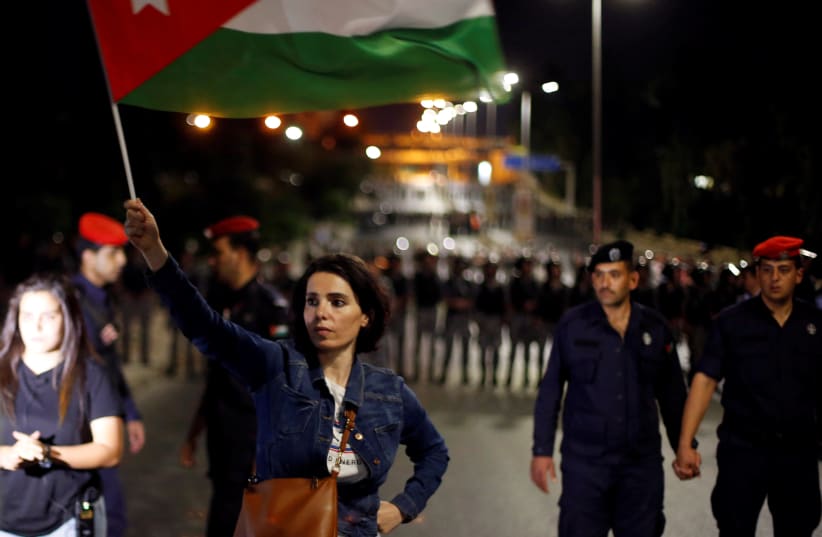Many social media users, however, have also seized the opportunity to lash out at the Jordanian government for failing to secure the release of the detainees.مسؤول أردني: سيبقى المستوطن الإسرائيلي الذي تجاوز الحدود ودخل الأردن بطريقة غير شرعية معتقلاً لدينا كورقة ضغط للإفراج عن الاسير مرعي وهبه اللبدي ..#الحرية_لهبة_اللبدي pic.twitter.com/Ej3N5VabpE
— hossam arar (@ArarHossam) October 30, 2019
“It is unreasonable and unacceptable that Jordan leave a helpless Jordanian female citizen in Israeli occupation prison,” a Jordanian social media user wrote to King Abdullah. “The government must do its utmost to release Heba and bring her back safely to Jordan.”Other social media users posted photos of King Abdullah and his crown prince in military uniform during an army drill with sarcastic remarks such as: “The King and his Crown Prince on a mission to release Heba Labadi from the occupation prison.”Jordanian government officials denied charges that they haven’t been doing enough to pressure Israel to release the detainees. In the past few weeks, Jordan has taken a number of steps in this regard, they said, noting that a representative of the Jordanian Embassy in Israel has visited Labadi and Meri several times. Moreover, Jordan has been working through diplomatic channels with Israel to end the crisis, the officials added.An official from the Jordanian Embassy in Israel was scheduled to visit Labadi again on Wednesday in light of reports that her health condition has deteriorated as a result of the hunger strike.King Abdullah, who returned to Amman on Wednesday from a visit to Saudi Arabia and Kuwait, is scheduled to hold urgent consultations with his senior advisers on the crisis surrounding the detention of Labadi and Meri.Sources in Amman said they did not rule out the possibility that the monarch would make a personal appeal to Prime Minister Benjamin Netanyahu to release the detainees.“The king is in a difficult position,” said a prominent Jordanian journalist closely associated with the royal palace in Amman. “On the one hand, he’s facing pressure and criticism for failing to release Labadi and Meri. On the other hand, he’s trying to avert a further deterioration in relations between Jordan and Israel.”The journalist and some Jordanian government officials criticized Israel’s handling of the crisis and warned that the continued detention of the two would cause more damage to relations between the two countries.“It would have been easier for all had Israel banned them from entering the West Bank or deported them shortly after interrogating them,” said a government official in Amman. “Holding them under administrative detention was a bad idea. In addition, Labadi’s hunger strike and reports about her deteriorating health condition are adding fuel to the fire. The only people who benefit from this crisis are the enemies of the peace treaty between Jordan and Israel.”A Jordanian political analyst said that the actions of the Israeli government in the past few years have caused “serious damage” to relations between the two countries. Jordan, he added, is particularly worried about Israel’s actions and policies in Jerusalem, particularly the Haram al-Sharif (Temple Mount) compound.In August, the Jordanians summoned the Israeli ambassador in Amman to protest “Israeli violations and provocations” at the holy site. The move came after Public Security Minister Gilad Erdan said in a radio interview that Jews should be permitted to pray at the Temple Mount.The Jordanian king is apparently worried that Israel’s attempt to change the status quo at the holy site would undermine the Hashemites’ custodianship over Muslim holy sites in Jerusalem. In the 1994 peace treaty, Israel commits to “respect the present special role of the Hashemite Kingdom of Jordan in Muslim holy shrines in Jerusalem.” In 2013, the Palestinian Authority also recognized Jordan’s role over the religious sites.The assessment in Amman is that the current crisis with Israel will be resolved. That does not mean, however, that relations between Israel and Jordan will warm up any time in the near future. If anything, the latest crisis will further intensify anti-Israel sentiment in Jordan and solidify the “cold peace” between the two countries.#انقذوا_هبة_اللبديصورة للملك وولي العهد وهم بيرجعوا الأسيرة هبة اللبدي من سجون الإحتلال pic.twitter.com/GFosY6ZCgg
— :-/ (@Mohammedghozz1) October 30, 2019
